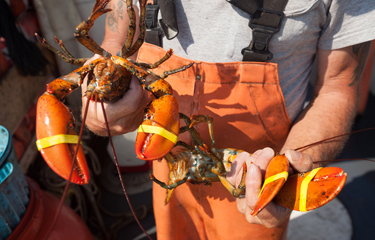The U.S. state of Maine is requesting federal aid due to the ongoing impacts the COVID-19 outbreak is having on its fisheries.
Maine’s governor, Janet Mills, recently sent a letter to the administration of U.S. President Donald Trump requesting federal assistance for the state’s seafood industry as trade disruptions and restaurant closures affect the state’s valuable lobster fishery, which was worth USD 485 million (EUR 451.4 million) in 2019. The fishery has been heavily impacted by the ongoing pandemic as demand for lobsters has plummeted.
“Some harbors are reporting that dealers will not accept the landing of any product, and those that are buying are paying as little as USD 2.00 [EUR 1.86] per pound, reflecting a 75 percent reduction in price over just four weeks,” Mills wrote in her letter to Trump. “As of yesterday, only a handful of boats were out tending their gear, when there are typically hundreds fishing in March.”
Most lobster fishers in the state are independent, and own their own boats and traps. That means many of them won’t qualify for any type of unemployment, even if they have no income.
“In the short-term, harvesters only have limited opportunities within their communities to sell small quantities of product in hopes to earn just enough money to buy weekly necessities,” Mills wrote in the letter. “None of these self-employed harvesters are eligible for unemployment. In the long-term, it is clear that the collapse of the international and larger domestic markets will devastate Maine’s commercial fisheries.”
It isn’t just the lobster fishermen who have been impacted. The Maine Department of Marine Resources has announced a complete closure of Maine’s elver fishery, which had been scheduled to start on 22 March. The closure will be for a minimum of two weeks, and will be reassessed regularly.
"The coronavirus pandemic continues to impact Maine's fisheries in ways we could not have imagined," Maine Department of Marine Resources Commissioner Patrick Keliher said in a release announcing the closure. "Portions of the elver fishery make it impossible to follow social distancing recommendations, including maintaining six feet from other people to reduce the spread of this disease."
Elvers have become Maine’s second-most-valuable fishery in recent years, bringing in USD 20.1 million (EUR 18.6 million) in 2019. The average price-per-pound of the species was USD 2,000 (EUR 1,860), with a yearly quota of 9,688 pounds.
Even without the closure, the value of the fishery was in question due to the ongoing trade disruptions to Asia stemming from the COVID-19 outbreak. The vast majority of elvers – or glass eels – are sent to Asia, particularly China, where they are then raised in aquaculture operations into adult eels for consumption.
“We have gotten word that the price is not looking good,” the Maine Elver Fishermen’s Association wrote on its Facebook page last month as the COVID-19 outbreak was starting to cause issues. “As far as we know, the price is going to be 25 percent lower than last year.”
Photo courtesy of spwidoff/Shutterstock







